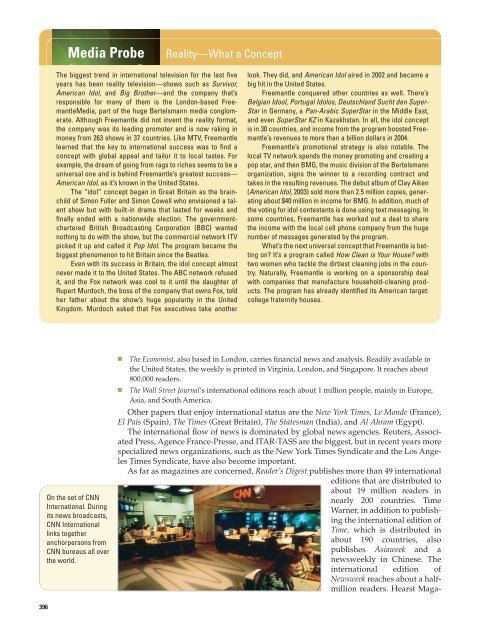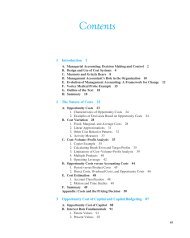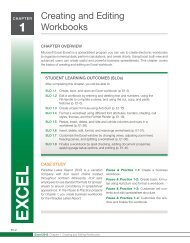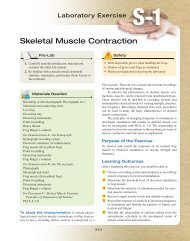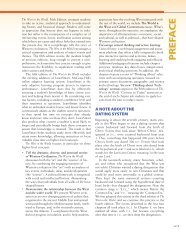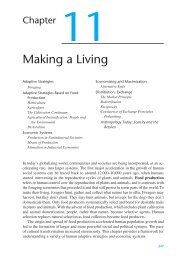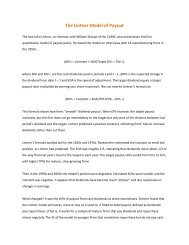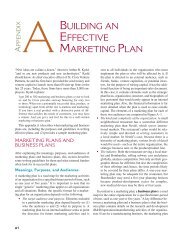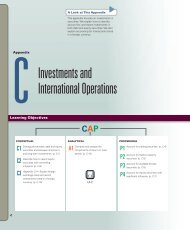Chapter 7: Radio (30629.0K) - McGraw-Hill
Chapter 7: Radio (30629.0K) - McGraw-Hill
Chapter 7: Radio (30629.0K) - McGraw-Hill
You also want an ePaper? Increase the reach of your titles
YUMPU automatically turns print PDFs into web optimized ePapers that Google loves.
Media Probe<br />
Reality—What a Concept<br />
The biggest trend in international television for the last five<br />
years has been reality television—shows such as Survivor,<br />
American Idol, and Big Brother—and the company that’s<br />
responsible for many of them is the London-based FreemantleMedia,<br />
part of the huge Bertelsmann media conglomerate.<br />
Although Freemantle did not invent the reality format,<br />
the company was its leading promoter and is now raking in<br />
money from 263 shows in 37 countries. Like MTV, Freemantle<br />
learned that the key to international success was to find a<br />
concept with global appeal and tailor it to local tastes. For<br />
example, the dream of going from rags to riches seems to be a<br />
universal one and is behind Freemantle’s greatest success—<br />
American Idol, as it’s known in the United States.<br />
The “idol” concept began in Great Britain as the brainchild<br />
of Simon Fuller and Simon Cowell who envisioned a talent<br />
show but with built-in drama that lasted for weeks and<br />
finally ended with a nationwide election. The governmentchartered<br />
British Broadcasting Corporation (BBC) wanted<br />
nothing to do with the show, but the commercial network ITV<br />
picked it up and called it Pop Idol. The program became the<br />
biggest phenomenon to hit Britain since the Beatles.<br />
Even with its success in Britain, the idol concept almost<br />
never made it to the United States. The ABC network refused<br />
it, and the Fox network was cool to it until the daughter of<br />
Rupert Murdoch, the boss of the company that owns Fox, told<br />
her father about the show’s huge popularity in the United<br />
Kingdom. Murdoch asked that Fox executives take another<br />
look. They did, and American Idol aired in 2002 and became a<br />
big hit in the United States.<br />
Freemantle conquered other countries as well. There’s<br />
Belgian Idool, Portugal Idolos, Deutschland Sucht den Super-<br />
Star in Germany, a Pan-Arabic SuperStar in the Middle East,<br />
and even SuperStar KZ in Kazakhstan. In all, the idol concept<br />
is in 30 countries, and income from the program boosted Freemantle’s<br />
revenues to more than a billion dollars in 2004.<br />
Freemantle’s promotional strategy is also notable. The<br />
local TV network spends the money promoting and creating a<br />
pop star, and then BMG, the music division of the Bertelsmann<br />
organization, signs the winner to a recording contract and<br />
takes in the resulting revenues. The debut album of Clay Aiken<br />
(American Idol, 2003) sold more than 2.5 million copies, generating<br />
about $40 million in income for BMG. In addition, much of<br />
the voting for idol contestants is done using text messaging. In<br />
some countries, Freemantle has worked out a deal to share<br />
the income with the local cell phone company from the huge<br />
number of messages generated by the program.<br />
What’s the next universal concept that Freemantle is betting<br />
on? It’s a program called How Clean is Your House? with<br />
two women who tackle the dirtiest cleaning jobs in the country.<br />
Naturally, Freemantle is working on a sponsorship deal<br />
with companies that manufacture household-cleaning products.<br />
The program has already identified its American target:<br />
college fraternity houses.<br />
On the set of CNN<br />
International. During<br />
its news broadcasts,<br />
CNN International<br />
links together<br />
anchorpersons from<br />
CNN bureaus all over<br />
the world.<br />
■ The Economist, also based in London, carries financial news and analysis. Readily available in<br />
the United States, the weekly is printed in Virginia, London, and Singapore. It reaches about<br />
800,000 readers.<br />
■ The Wall Street Journal’s international editions reach about 1 million people, mainly in Europe,<br />
Asia, and South America.<br />
Other papers that enjoy international status are the New York Times, Le Monde (France),<br />
El País (Spain), The Times (Great Britain), The Statesman (India), and Al Ahram (Egypt).<br />
The international flow of news is dominated by global news agencies. Reuters, Associated<br />
Press, Agence France-Presse, and ITAR-TASS are the biggest, but in recent years more<br />
specialized news organizations, such as the New York Times Syndicate and the Los Angeles<br />
Times Syndicate, have also become important.<br />
As far as magazines are concerned, Reader’s Digest publishes more than 49 international<br />
editions that are distributed to<br />
about 19 million readers in<br />
nearly 200 countries. Time<br />
Warner, in addition to publishing<br />
the international edition of<br />
Time, which is distributed in<br />
about 190 countries, also<br />
publishes Asiaweek and a<br />
newsweekly in Chinese. The<br />
international edition of<br />
Newsweek reaches about a halfmillion<br />
readers. Hearst Maga-<br />
396


